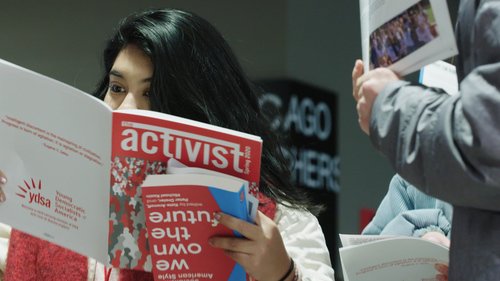These are the democratic socialists backing Bernie Sanders

Connor McClelland is a democratic socialist. He says it’s because of where he’s from.
“I’m originally from West Virginia, and so every time I go home, you see the mountains are just cleared. The trees are gone. Coal dust covers the roads. But like, no one’s life is improving there. It’s just extraction. It’s extraction all the time,” he says.
“I think we have to restructure society in a different way. There has to be more regulation. There has to be a vision for the future in which the people who work are valued higher than they are now.”
In poll after poll, young people are politically much further to the left of older Americans. According to Gallup, 52% of 18- to 34-year-olds have a positive view of socialism, while fewer, 47%, have a positive view of capitalism. (For comparison, more than two-thirds of people older than 55 have a positive view of capitalism.)
That age group is at the heart of Bernie Sanders‘ support as he seeks the Democratic nomination. Nationally, 54% of Democratic voters younger than 30 back Sanders, a democratic socialist. In the Nevada caucuses, Sanders won around two-thirds of voters younger than 30, according to entrance polls.
This enthusiasm was apparent at the Young Democratic Socialists of America conference in Chicago earlier this month. McClelland road tripped with 11 people from East Tennessee State University to join 275 student activists, who had come to learn how to be better organizers.
While the Democratic Socialists of America, the larger group behind the YDSA, has been around since the early 1980s, it saw a surge in membership with Sanders’ presidential campaign in 2016. In 2014, the DSA took in less than $300,000 in contributions and grants. Just three years later, in 2017, that number was more than $2.1 million. Membership also has grown from 24,000 members to 56,000 in three years. And according to DSA spokesman Lawrence Dreyfuss, in 2019, the group took in more than 180,000 donations averaging $18.80.
Last year, the DSA endorsed Sanders, and announced it would run an independent expenditure campaign to get the vote out for Sanders in the 2020 presidential election.
“I want to say I’ve been a socialist my whole life,” Sam Lynn, a student at UNC Chapel Hill, said. “I didn’t know it until Bernie Sanders started running in 2016.”
‘Y’allidarity’
McClelland and his friends spilled out of their vans and into a hostel in 15-degree weather. Their roadtrip had taken 14 hours. Some of the women refreshed their makeup in a fluorescent-lit room with six bunk beds, and then, daunted by the idea of finding another parking spot, they all took an Uber to the conference. There, they mingled with the rest of the 275 college and high school students who’d come to learn how to be better organizers. The non-vegans were reminded not to take the vegan pizza.
Sanders inspired many of these students to take up local activism. Last year, the group at East Tennessee State University successfully campaigned to increase the wages of the lowest paid adjunct professors on campus.
“You don’t expect a bunch of young socialists to be in the middle of Tennessee, but I think we’re, like, one of the biggest political clubs on campus,” said Aria Inaba, who celebrated her 21st birthday at the conference.
Her friend, Carson Morgan, wore a “Y’allidarity” pin on his lapel, “to raise awareness that there are leftist movements in red states.” Another pin said, “Fashion.”
“It’s not an official stance by the YDSA, but a personal belief,” he said. “Fashion, not fascism.”
The students listened to panels about the Green New Deal, union organizing in Chicago and electing Sanders, which were interrupted by periodic chants and waving flags. At a workshop on how to deal with the press, they learned how to get the word out. An instructor said of journalists, “They’re capitalists ultimately, most of them. They want things that they can sell, for lack of a better word. Luckily, socialism sells.”
If you want to feel the generational shift apparent in the 2020 election, listen to young socialists explain how the 2008 financial crisis affected their families — as they remind you they were in third grade when it happened.
“Some millennial people remember [the 2008 crisis] quite well, and they have a lot of feelings about that and how that’s changed their life,” McClelland said. “People who are really young like me — who’re just getting in now, old enough to vote — have seen maybe even their parents struggling under that.”
Sometimes his family had insurance, and sometimes they didn’t.
“Some things that people forget is, like in my case, I had a single mother and it was like she just couldn’t get off work. You can’t leave work, you can’t stop working,” he said. “I remember how hard it was and how much of a struggle it was.”
Given the sharp ideological age gap, one might expect these students to have fought with their older relatives over politics. But it was striking how many students said they were socialists because of the experiences of their parents.
Austin Cable, who co-founded the YDSA chapter at East Tennessee State University with McClelland, said his dad is a Trump supporter. Cable says he got his dad to be OK with his political views by not criticizing the president, but instead explaining Sanders’ policies.
“I asked my dad, ‘When’s the last time you’ve had health care?’ He said, ‘I have never had health care.’ And he’s almost 60 years old. And I said, ‘Well, Bernie Sanders wants to make it to where everybody has health care,'” Cable said. “At the end, I just said, ‘Dad, you know, I support Bernie Sanders ’cause I support you.'”
Lynn, the student at UNC Chapel Hill, said he and his sister didn’t have health care growing up. “I have health care now, it still affects the way that I view my health and the health of the people that I love,” Lynn said. “And I feel like I still feel like even to this day, I would rather I truly believe I would rather die than become an economic burden on my family.”
Beth Girma’s parents immigrated from Ethiopia in the late 1990s.
“I’ve seen my parents and my family members really work hard to achieve the so-called American dream…. which is in a way, like, impossible,” she said. They were both nurses who worked a lot of overtime. “I’ve never seen such hard workers. … but they shouldn’t have had to work this hard to afford my basic needs.” Girma, a student at Western Washington University, seemed to have had the toughest time convincing her parents.
“Politics ends up being a difficult thing for my family to talk about,” she said. “They did see a lot of regime change within their lifetime.”
‘They will lose in 2020 if it’s not Bernie Sanders’
But as enthusiastic as these students are about Sanders, many within the Democratic Party are worried the “socialism” label would be ballot box poison.
“I would say ‘panic’ would be the adjective to describe the mood right now,” former Chicago Mayor Rahm Emmanuel told CNN. And former Secretary of State John Kerry was overheard by NBC saying Sanders would take the Democratic Party “down whole.”
That could translate into a hurdle for Sanders. The New York Times spoke to 93 Democratic superdelegates “and found overwhelming opposition to handing the Vermont senator the nomination if he arrived with the most delegates but fell short of a majority.” Some floated the idea of Ohio Sen. Sherrod Brown seizing the nomination at the convention. Virginia Rep. Don Beyer suggested Sens. Mark Warner, Chris Coons or House Speaker Nancy Pelosi could be a nominee the party could rally behind.
But the young democratic socialists here predict that blocking a Sanders nomination would not go well for Democrats.
“If Bernie Sanders goes into the convention with a plurality of delegates and doesn’t come out the nominee, I genuinely think that will be the end of the Democratic Party,” Lynn said. “They will lose in 2020 if it’s not Bernie Sanders. They will lose in 2024. They will lose in 2028.”
McClelland said that in 2016, people wanted hope, and “Trump, no matter how twisted and ugly it is, gave some people hope,” while the Democrats did not. He sees one chance for 2020 to be different. “Bernie Sanders, I think, is the only candidate in the Democratic Party who can do that. He can give people hope.”



